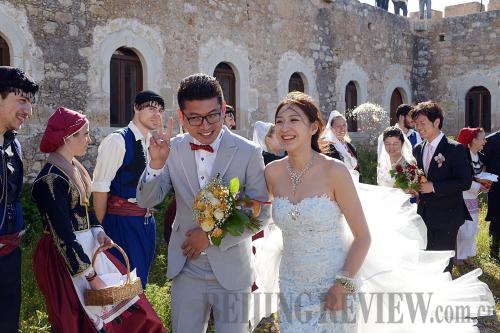|
 |
|
MASS MATRIMONY: Chinese couples from Shanghai walk past Greeks dressed in traditional Cretan attire during a mass wedding in the city of Chania on the Greek island of Crete on April 25 (XINHUA/AFP) |

Europe is being visited frequently by Chinese leaders in 2014. In March, President Xi Jinping made the first ever visit by a head of state from China to Brussels, which is, in effect, the headquarters of the EU and the place where most of its main offices and representatives are based. In June, both Premier Li Keqiang and fellow Political Bureau Standing Committee member Liu Yunshan visited countries in Europe. There will undoubtedly be other visits before the end of the year. And this is on top of the many visits by EU member states' and European countries' leaders to China.
Of course, all this activity could be interpreted simply as recognition that two such vast and important trading entities need this level of engagement with each other. In terms of trade flows and inward and outward investment, the health of the EU and China are intimately interlinked. However, this is also a relationship where it is not just about the market, but about broader strategic interests.
Overcoming challenges
China and the EU established the framework for a comprehensive strategic partnership over a decade ago in 2003. At the heart of this was the hope for more openness between their economies, but also for agreement on greater collaboration, more sharing of ideas and people-to-people links, and attempts to map out a common vision of the world where they might be able to work more easily with each other in a geopolitical fashion.
Events have occurred that have threatened to challenge that aspiration. In 2005, the EU failed to lift the arms embargo that had been in place since 1989 following pressure from the United States. It also failed to bestow market economy status on China despite doing so for Russia. In addition, there were disagreements a few years later over what action to take in Syria during the prolonged civil war there, and over the response to the unrest in Ukraine over 2013 into 2014.
The EU has also transformed over this period, so that it is not the same entity even compared to a little over a decade ago. It is now bigger, embracing a number of new countries that joined the existing ones to bolster the overall total of EU member states to 28. Additionally, it went through the trauma and self-doubt of the 2009-10 euro-zone crisis, where for a period it looked like the whole project of a common currency shared by 17 of the member states would break up.
In 2014, we can see that the EU was a more robust entity than many had suspected. The visits by Chinese leaders is, in some ways, a recognition that for all the frustrations the outside world experiences while dealing with the EU, it remains a remarkable project—an undertaking that has lasted multiple crises and challenges, and now looks secure. The UK is, as ever, the great spoiler in this, with its planned referendum in 2017 about continuing as a member. But Prime Minister David Cameron has made it clear that he wants reform of the EU, not withdrawal from it. For all the shocks over the last few years, the EU is a major part of the global economic and political system. Chinese leaders take it seriously—often more so than some of the national leaders within the EU.
They are right to wish the EU success. In a world of mounting uncertainty, from Southeast Asia where Thailand is undergoing another period of military rule, to Ukraine and its tensions with Russia, to unrest over a falling economy in Brazil and continuing spats between South Korea and North Korea—to say nothing of the multiple instabilities in Africa, Central Asia and South Asia—the EU at least preserves some certainty. And on the whole, the sources of stability within the international order are things that are increasingly necessary. Europe has a searing history of the costs of internal conflict and instability. In that sense, the EU sets itself up as an exemplar of unity built on centuries of fighting.
There are times when the EU presents this in a seemingly superior and preachy manner. Many Chinese criticize it for the ways in which, like the United States, it seems to want to promote its values and ideals for the rest of the world to follow. Many of these social and political values were enshrined in the Lisbon Treaty of 2009, which now, in effect, serves as the Constitution of the whole union. Even so, when he went to the College of Europe in March, President Xi was able to speak of China and Europe being "civilization partners." This hints at least of some cultural and values overlap between the two.
Where might this overlap be located? In surveys completed by Nottingham University in the UK and Chinese partners, which were conducted across a number of cities in China from 2009 and funded by the EU, questions were asked about public views on Europe among different sectors of the Chinese urban population. On the whole, the feedback was positive. Europe was regarded as a place of culture, history, great art, and a favored tourist destination. Those surveyed were knowledgeable about not only Europe and its different countries, but also, more surprisingly, about the EU. For instance, most of those surveyed knew that it was mainly headquartered in Brussels.
A pragmatic partnership
This warm public view of Europe is a great asset for Europeans. They enjoy, on the whole, a more positive response, at least according to these surveys, than other countries like the United States and Japan, where answers were more qualified and complex. There is one challenge, however: Unlike the United States and Japan, which at least have unified country identities, Europe is a continent, and so it is hard to categorize. Usually people look on it as a mixture of the different largest countries, from Germany to France, to Spain, Italy, Greece and the UK. It does not share a common language; not even a common cuisine or ethnicity.
Europe, if it is anything, is about diversity. And the EU has introduced at least some harmony among this diversity so that the very profound clashes of the past, from the European wars of the 13th century onward right up to the devastating fights of the 20th century World Wars, are unrepeatable. In that sense, the idea of civilizational values are the things that most tie Europe to China is a useful one. It is not as countries, therefore, that China and Europe can interact. Nor is it wholly about markets and pursuing economic self-interest. It is about being the homes of two great civilization traditions, which have contributed immeasurably to the world's heritage and the development of humanity.
This is a very respectful label to accord Europe, and that President Xi stated it right at the heart of Europe, and the EU project, is symbolically highly important. One of the complaints over the last decade since strategic relationship status in 2003 is that there has sometimes been a lack of respect by the EU side toward China. In many ways, the civilization framework addresses this. If a partner talks to you as an equal in such a crucial area, then the message is clear—there needs to be equality in terms of dialogue and mutual views.
It is true that the documents issued at least officially by the EU have the tone of a teacher trying to set a student straight when they address China. They speak of China needing almost to become more like the EU, and to align itself with values the EU says it stands by and espouses. Over the last decade, things have become more complex in this area. The EU has had to ask itself some deep questions regarding the nature of commitment between its diverse members. In some ways it has become pragmatic and less ambitious.
Perhaps this means that the label "pragmatic civilization partners" is the best one to use now. It moves away from talking purely of a transactional relationship where it is all about trade and the hunt for material benefit, but it does at least allow both sides to stand by what they believe their cultural, social and other values are while respecting each other. That reintroduction of a certain level of idealism about each other, and the possibility at least from time to time of dreaming with each other and trying to aim for the same things is important. After all, the EU represents in many ways the victory of ideals over day-to-day reality. Its continued existence in the face of crises is a good thing—for the EU itself, as well as for China and the rest of the world.
The author is an op-ed contributor to Beijing Review and executive director of the China Studies Center at the University of Sydney
Email us at: yanwei@bjreview.com |
